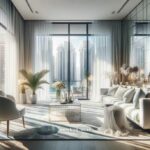
How to Maximize Natural Light in a North-Facing Dubai Apartment
January 17, 20243D Rendering for Interior Design Dubai
January 19, 2024Eco-Friendly Restaurant Fitout Solutions for Dubai Cafes: A Guide to Sustainability in the Desert
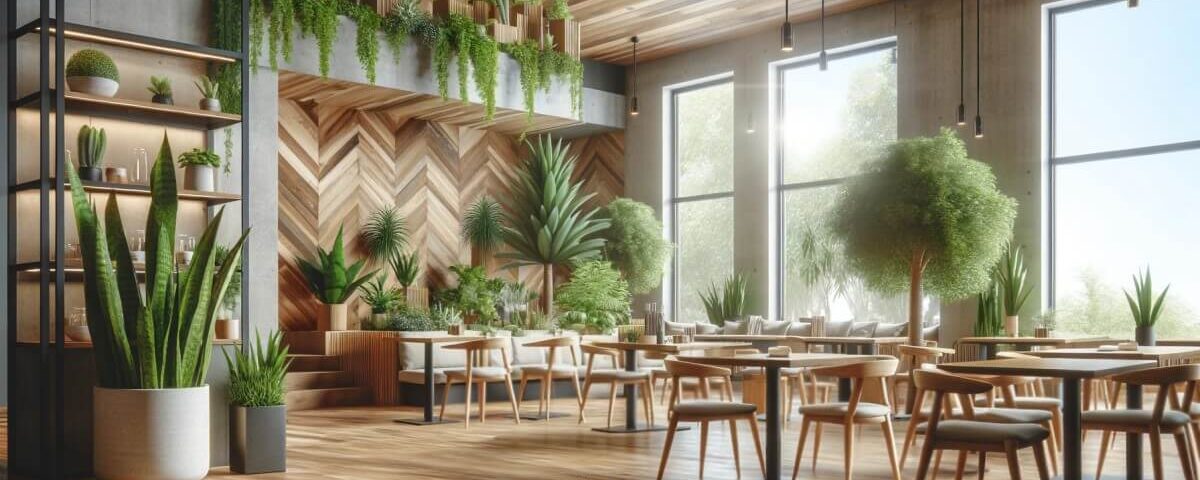
In Dubai’s dynamic and luxurious environment, a new trend of environmental consciousness is taking root, particularly in the cafe and restaurant sector. This movement towards sustainability is gaining momentum, with many establishments seeking eco-friendly restaurant fitout solutions. In this article, we explore how Dubai cafes can integrate sustainable practices into their fitouts, striking a balance between aesthetic appeal, practicality, and ecological mindfulness.
Table of Contents
Embracing Local Materials
A crucial element of eco-friendly restaurant fitout solutions for Dubai cafes is the utilization of locally-sourced materials. By choosing regional items such as reclaimed wood, traditional clay bricks, and locally woven fabrics, cafes can significantly lower their environmental impact while adding a distinctive Arabian essence to their decor. These materials are not only sustainable but also help in preserving and celebrating the local heritage.
Energy Efficiency
The cornerstone of sustainable fitouts is energy efficiency. Utilizing natural lighting through expansive windows and skylights can dramatically reduce the need for artificial illumination, thus conserving energy. In situations where artificial lighting is necessary, LED bulbs are preferred for their energy-saving properties and longevity. Moreover, integrating smart systems for lighting and temperature control can lead to more efficient energy use, adapting to occupancy levels and time-of-day variations.
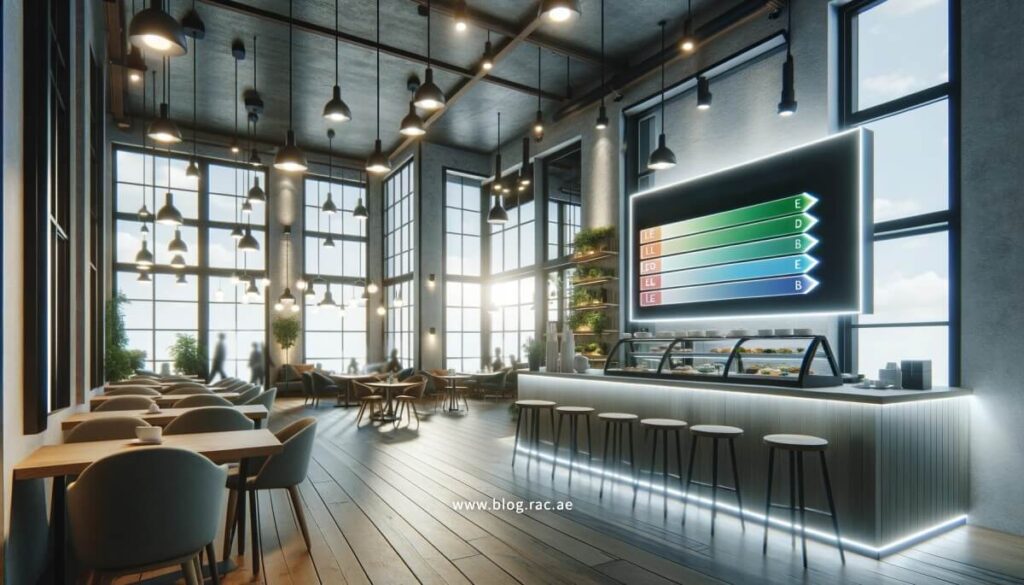
Water Conservation
Considering Dubai’s desert climate, conserving water is a critical aspect of eco-friendly restaurant fitout solutions. The installation of water-efficient fixtures such as low-flow taps and toilets can substantially reduce water wastage. Water-smart landscaping that includes plants suited to arid conditions and greywater systems for irrigation can also contribute to water conservation. Additionally, cafes can incorporate rainwater harvesting to collect and repurpose water.
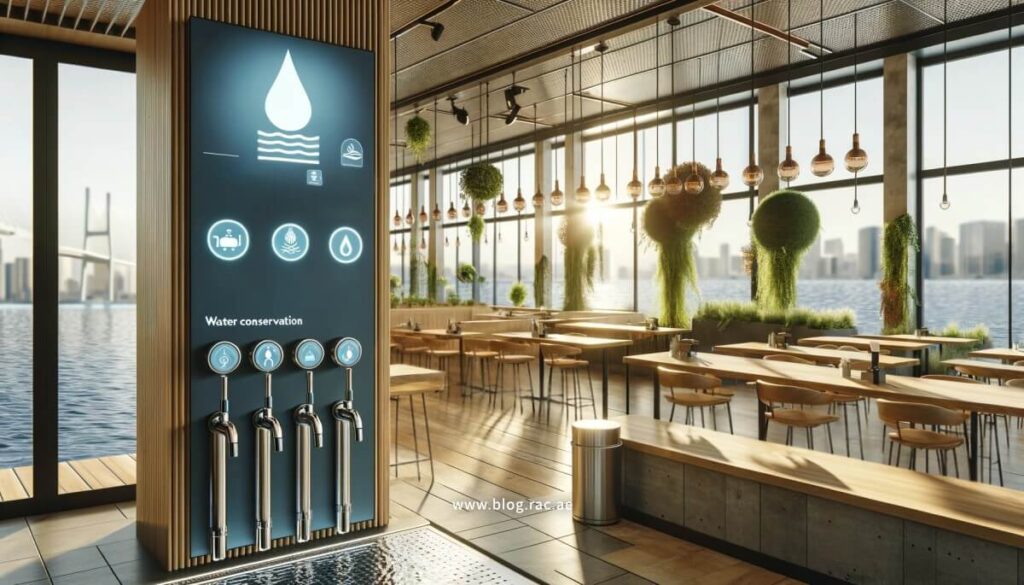
Waste Reduction and Recycling
Incorporating sustainable furnishings and decorations is vital for eco-friendly fitouts. Choosing recycled materials or sustainably harvested wood for furniture, along with repurposing vintage items, helps reduce waste and adds a unique flair to the cafe’s interior. Practices like composting organic waste and opting for reusable or biodegradable consumer products like cloth serviettes and ceramic dishware further aid in minimizing the ecological footprint.
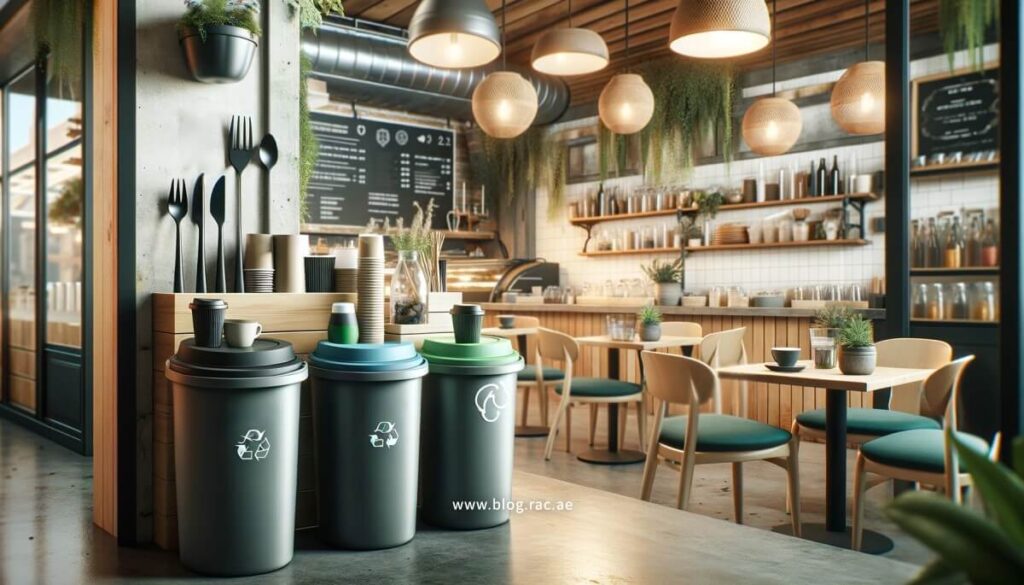
Beyond the Fit-Out
Sustainability in cafes extends beyond the physical setup. It involves the entire operational approach, including the use of environmentally friendly cleaning agents, sourcing ingredients locally and ethically, and providing plant-based food options. Engaging with the community through sustainability-focused events and collaborating with local eco-groups further reinforces the commitment to environmental stewardship.
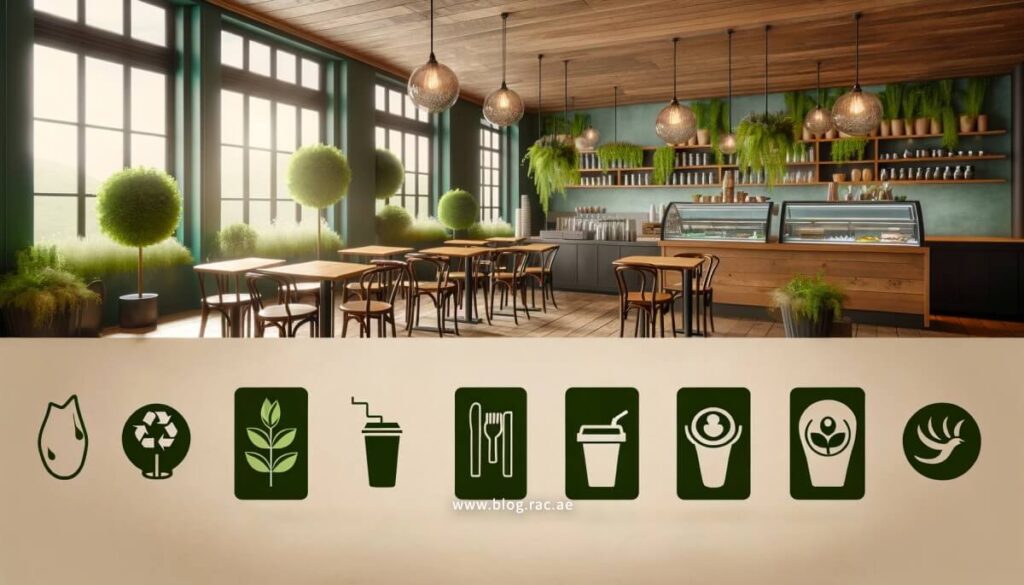
Making a Difference
Adopting eco-friendly restaurant fitout solutions enables Dubai’s cafes to not only mitigate their environmental impact but also attract eco-aware patrons. In a city celebrated for its opulence, establishing a sustainable niche for dining and social interaction is a bold and significant move. Remember, the journey towards sustainability is progressive – each small initiative, from choosing local building materials to implementing waste management strategies, contributes positively. Dubai’s cafes are poised to set benchmarks in sustainable hospitality, proving that ecological responsibility and exceptional dining experiences can indeed coexist harmoniously.
To sum up, the journey to a sustainable cafe culture in Dubai involves thoughtful choices in building materials, energy and water management, waste handling, and overall business operations. It’s about making informed, eco-conscious decisions that benefit the planet, the community, and the business itself. Let’s forge a more sustainable future for Dubai’s thriving cafe scene, one eco-friendly fitout at a time. Every step toward sustainability, however small, is a step in the right direction.
Key Takeaways: Eco-Friendly Restaurant Fitout Solutions for Dubai Cafes
- Utilize Local Materials: Embracing locally-sourced materials like reclaimed wood and traditional clay bricks reduces environmental impact and celebrates local heritage.
- Enhance Energy Efficiency: Maximize natural lighting and use LED bulbs and smart systems to conserve energy.
- Conserve Water: Implement water-efficient fixtures, water-smart landscaping, and rainwater harvesting to minimize water usage.
- Reduce Waste: Use recycled materials, repurpose vintage items, compost organic waste, and opt for biodegradable products to reduce the ecological footprint.
- Sustainable Operations: Incorporate eco-friendly cleaning agents, source ingredients locally and ethically, and offer plant-based food options to promote overall sustainability.
FAQs
1. How can Dubai cafes use local materials in their fitouts to be more eco-friendly?
Dubai cafes can use local materials such as reclaimed wood, traditional clay bricks, and locally woven fabrics. These materials not only reduce environmental impact but also add a distinctive Arabian essence to the decor, celebrating local heritage.
2. What are the benefits of using LED bulbs in a sustainable cafe fitout?
LED bulbs are energy-efficient, have a longer lifespan, and reduce electricity consumption compared to traditional bulbs. They help conserve energy and lower the operational costs of a cafe, making them an ideal choice for sustainable fitouts.
3. How can cafes in Dubai maximize natural lighting?
Cafes can maximize natural lighting by installing expansive windows and skylights. This reduces the need for artificial lighting during the day, conserving energy and creating a bright, inviting atmosphere.
4. What water-efficient fixtures can cafes install to conserve water?
Cafes can install low-flow taps and toilets, as well as greywater systems for irrigation. These fixtures significantly reduce water wastage, which is crucial in Dubai’s desert climate.
5. How can water-smart landscaping contribute to sustainability?
Water-smart landscaping involves using plants that are suited to arid conditions, which require less water. This method conserves water resources and maintains a visually appealing outdoor space for cafes.
6. What are the advantages of using recycled materials for furniture in cafes?
Using recycled materials for furniture helps reduce waste and the demand for new resources. It also adds unique, eco-friendly elements to the cafe’s interior, appealing to environmentally conscious customers.
7. How can cafes implement effective waste management practices?
Cafes can implement waste management practices such as composting organic waste, recycling materials, and using reusable or biodegradable consumer products like cloth serviettes and ceramic dishware. These practices minimize the ecological footprint and promote sustainability.
8. Why is sourcing ingredients locally and ethically important for sustainable cafes?
Sourcing ingredients locally and ethically reduces the carbon footprint associated with transportation and supports local farmers and businesses. It also ensures that ingredients are fresh and sustainably produced.
9. How can cafes incorporate plant-based food options into their menu?
Cafes can offer a variety of plant-based dishes made from locally sourced ingredients. This not only caters to the growing demand for vegetarian and vegan options but also supports sustainable agriculture practices.
10. What role do eco-friendly cleaning agents play in sustainable cafe operations?
Eco-friendly cleaning agents reduce the use of harmful chemicals that can pollute the environment. They are safer for both the staff and customers, contributing to a healthier and more sustainable cafe operation.
11. How can cafes engage with the community to promote sustainability?
Cafes can engage with the community by hosting sustainability-focused events, collaborating with local eco-groups, and educating customers about their sustainable practices. This fosters a sense of community and encourages collective environmental responsibility.
12. What are some examples of smart systems for lighting and temperature control in cafes?
Smart systems include automated lighting controls that adjust based on occupancy and time of day, as well as programmable thermostats that optimize temperature settings for energy efficiency. These systems help reduce energy consumption and enhance comfort.
13. How can rainwater harvesting benefit a cafe in Dubai?
Rainwater harvesting allows cafes to collect and reuse rainwater for non-potable purposes such as irrigation and cleaning. This practice conserves water resources and reduces reliance on the municipal water supply.
14. What are the environmental benefits of offering biodegradable products in cafes?
Biodegradable products break down naturally and reduce the amount of waste that ends up in landfills. Using these products in cafes minimizes the environmental impact and supports a circular economy.
15. How can cafes balance aesthetic appeal with practicality in sustainable fitouts?
Cafes can balance aesthetic appeal with practicality by choosing stylish yet sustainable materials and designs. Incorporating elements like reclaimed wood, energy-efficient lighting, and smart furniture placement can create an attractive and functional space that adheres to eco-friendly principles.


0 Comments
nogensinde løbe ind i problemer med plagorisme eller krænkelse af ophavsretten? Mit websted har en masse unikt indhold, jeg har